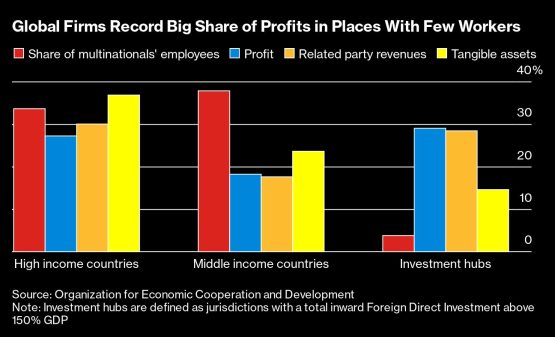The Biden administration secured an extension of a worldwide freeze on new digital taxes, putting it on a collision course with Canada after Ottawa refused to endorse the deal.
The Organisation for Economic Cooperation and Development unveiled the one-year extension in Paris Wednesday. This gives the more than 140 nations involved until the end of 2024 to ratify a new global rule-book for allocating taxing rights over the largest multinationals, known as OECD Pillar One.
The 2021 standstill on so-called digital services taxes helped defuse trade battles while negotiators sought to iron out the broader tax agreement. But the discussions have proved slow going — in part because Republicans in the US Congress have signaled unwillingness to endorse the wider pact.
The extension will only happen if enough countries sign a multilateral convention, or MLC, by December 31, OECD Center on Tax Policy and Administration Director Manal Corwin said. That group must include 30 jurisdictions, which combined must be home to at least 60% of affected companies, she said.
But documents the OECD released also show the standstill could go through 2025 “assuming sufficient progress has been made by that date towards the entry into force of the MLC,” a statement from the governments said.
Progress on technical aspects of the global deal and a prolonged truce would avert a sudden return to the trade tensions that plagued transatlantic relations during the Trump administration. The spat began after some European countries introduced levies on companies including Alphabet’s Google and Meta Platforms’s Facebook. The US threatened to retaliate with tariffs.
Canada’s rejection of the freeze on new DSTs raises again the possibility of trade tensions between the US and a close ally.
With nations agreeing to the standstill without a deadline stipulating when Pillar One will come into force, Canada is “at a disadvantage relative to countries which have continued collecting revenue under their pre-existing DSTs,” Finance Minister Chrystia Freeland said.
“Canada does not disagree with the substance of the multilateral treaty that has been negotiated; indeed, we support it fully,” she said in a statement Wednesday. “However, without any firm and binding multilateral timeline to implement Pillar One, Canada cannot support the extended standstill.”
The Information Technology Industry Council, which represents companies including International Business Machines Corp., Microsoft and Apple, said Ottawa’s decision is “deeply disappointing.”
It urged Canada “to focus its energies on the inclusive framework’s efforts and forgo advancement of a unilateral tax that would undermine ongoing negotiations and further fragment the international tax system,” it said in a statement.
Canada was among a group of five countries, which also included Russia and Belarus, that hadn’t supported the agreement as of Wednesday.
Under Prime Minister Justin Trudeau, Canada has said it’s committed to implementing a new DST in early 2024, one that would apply retroactively to January 1, 2022, if the global tax agreement has not been implemented by the end of this year.
The nation has yet to decide on whether to still legislate its DST by January 1, 2024, according to a Canadian official. The call will depend in part on how talks with OECD partners about Ottawa’s concerns on the absence of a firm Pillar One timeline progress, the official said.
The Office of the US Trade Representative in December 2021 expressed concern over Canada’s proposed DST and pledged to “examine all options, including under our trade agreements and domestic statutes” should it be adopted.
In Washington, support for the overall deal has shifted with elections. While big US tech companies backed the plan as a way of stemming the mushrooming of national levies around the world, the Trump administration proved reluctant to give up taxing rights on American companies.
The Biden administration, by contrast, has enthusiastically backed it but has failed to get the US Congress on board. The latest steps in Paris will at least give it a chance.
When details are finalised over how and how much corporate taxes will be redistributed across borders, Congress will know more precisely what it’s being asked to approve. For example, lawmakers will be able to estimate the net impact on US tax revenues.
© 2023 Bloomberg

